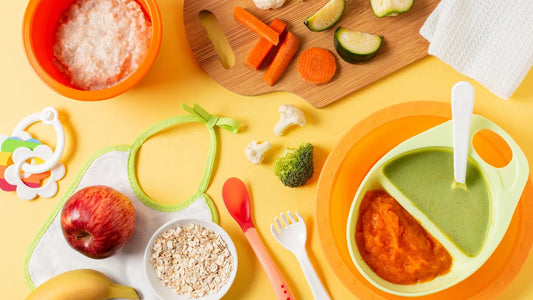Benefits Of Tulsi in Children's Diets
Tulsi, also known as holy basil, is an ancient Ayurvedic herb that has been used medicinally and spiritually in India for over 5,000 years. Recently, tulsi has been gaining recognition in Western culture as more people discover the incredible range of health benefits it offers. Adding tulsi to your child’s diet provides a diverse array of positive effects that can drastically improve their physical, mental, emotional and even spiritual wellbeing.
Packed with antioxidants and other healing phytochemicals, tulsi has scientifically-proven properties to boost immunity, respiratory health, heart health, brain power and more. Incorporating tulsi into your children’s nutritional intake protects their growth and development while warding off illness and future disease.
In this blog, we will explore some of the top reasons you should consider incorporating this super-herb into your child’s meals and drinks.
Boosts Immunity
Tulsi is a powerful adaptogen, meaning it helps the body fight stress and boosts internal reserves of energy. Scientific research shows that the phytochemicals and essential oils found in tulsi promote immune function and resistance to disease by increasing the body's production of immune defense cells.
Regularly eating and drinking tulsi will help fortify your child's immune system, preventing colds, flus, and other viruses from taking hold. The anti-bacterial and anti-fungal properties of tulsi also protect against harmful pathogens, acting as an internal antimicrobial agent.
Enhances Respiratory Health
The phytonutrients in tulsi have been shown to be extremely effective in supporting respiratory function and reducing symptoms associated with respiratory disorders. Tulsi acts as a natural decongestant and antihistamine, making it useful in treating colds, allergies, and asthma.
The antioxidants in tulsi also help protect lungs and airways against damage from environmental pollutants. Try adding tulsi to your child's diet to boost lung health and prevent respiratory illness.

Improves Oral Care
Chewing on tulsi leaves is a traditional remedy for mouth ulcers and infections. Tulsi helps restrict the growth of oral bacteria which can prevent cavities, tartar, and plaque buildup. The anti-inflammatory and antimicrobial properties of tulsi also aid in reducing pain and swelling associated with gum disease and other dental issues. Give your child tulsi oral products and have them chew the leaves for the best oral defense!
Reduces Fever
Thanks to its antimicrobial and anti-inflammatory agents, tulsi is the perfect herb for treating fever-related symptoms. The methanolic extracts of tulsi leaves have potent fever-reducing abilities.
Tulsi helps fight viral and bacterial infections underlying fever and accelerates healing by boosting blood circulation, speeding up metabolic processes and removing toxins from organs. It also soothes fever-related headaches, body pain, nausea and diarrhea.
During fever season, make sure your child eats lots of tulsi! Try adding the leaves to soups, stir fries or brewing tulsi tea to help beat the heat.
Enhances Digestion
A healthy gut means a healthy child! Tulsi leaves are an excellent digestive aid, stimulating the release of stomach acids to break down foods and making nutrients more bioavailable to the body. The essential oils in tulsi reduce inflammation in the stomach lining while the anti-bacterial agents destroy harmful pathogens that can cause intestinal infection.
Regularly eating tulsi leaves will regulate bowel movements, relieve gas/bloating and prevent acidity by enhancing healthy bile production. If your child deals with digestive issues like constipation, diarrhea or ulcers, be sure to add tulsi leaves to their meals.
Limits Stress & Anxiety
In today's high pressure world, chronic stress and anxiety are rampant even in young children. Tulsi acts as a powerful adaptogen and nerve tonic to help kids better cope with emotional turmoil for a calm, relaxed mind.
Tulsi modulates the neurotransmitters serotonin and dopamine to balance mood and promote positivism. It also reduces elevated cortisol levels caused by chronic stress. Give your overworked child some holy basil leaves in their tea or a plate of tulsi pilaf to re-energize their depleted nervous system and counteract burnout.
Boosts Brain Power
Tulsi doesn't just ease emotional troubles, it can also enhance cognitive function! The neuro-protective properties of tulsi support memory, intelligence, attention span and reaction time in children.
Regularly consuming holy basil increases blood flow to the brain and improves retention of information making it the perfect "brain tonic." Tulsi leaves also sharpen focus, boost creativity, elevate mood and improve motivation to study.
Protects Heart Health
The antioxidants, vitamins and minerals present in tulsi offer incredible cardio-protective benefits, preventing cell damage and mutation. Tulsi lowers unhealthy cholesterol levels, enhancing circulation and reducing plaque in arteries that can lead to heart attack and stroke.
Thanks to the anti-hypertensive agents in tulsi leaves, blood pressure is regulated for a healthy cardiovascular system. For lifelong heart wellness, add tulsi leaves to your child's meals! Try tulsi pesto on whole grain pasta or tulsi coconut water after sports practice to rehydrate their growing heart.
Supports Strong Bones & Teeth
In addition to the amazing phytochemicals in tulsi leaves, the plant is an excellent source of protein building amino acids, bone-bolstering calcium and tooth enamel-protecting phosphorus.
These essential nutrients facilitate growth by supporting bone density, muscle development and strong connective tissue in children. The calcium and vitamin K in tulsi leaves prevents bone disorders like osteoporosis later in life too.
For straight pearly whites, healthy gums and fracture-resistant bones, make sure your kids eat their tulsi!

Wards Off Chronic Disease
Many devastating chronic diseases like cancer, Alzheimer's and diabetes find their roots in damaging free radicals that mutate cell DNA structure. Powerful antioxidants like those found in abundance in tulsi leaves can neutralize these free radicals, preventing mutation-linked sickness by protecting cellular DNA.
Regularly consuming tulsi leaves will guard your child's body at the cellular level to prevent the development of debilitating chronic disorders for lifelong abundant health.
Conclusion:
As you can see, adding tulsi leaves and powder to your child's diet provides amazing multidimensional benefits shielding their physical, mental and emotional growth from harm. Tulsi's ability to enhance nearly every facet of wellbeing is why it is considered a sacred plant in Indian culture.
So what are you waiting for? Start giving your kids delicious tulsi tea, nutritious tulsi rice dishes, immunity-enhancing tulsi juice or soothing tulsi honey today and transform their health with this ancient wonder herb!
Shop for the Best Baby Care Products
FAQs
1. At what age can I start giving tulsi to my child?
Ans. You can start giving tulsi to children as young as 6 months old in small quantities, such as a few drops of tulsi juice or a pinch of tulsi powder mixed with milk or food.
2. How much tulsi should I give my child per day?
Ans. Generally, for children aged 2-6 years, you can give 1/2 to 1 teaspoon of tulsi powder or juice per day. For children aged 7-12 years, you can give 1-2 teaspoons per day. Always start with a small amount and increase gradually.
3. Are there any side effects of giving tulsi to children?
Ans. Tulsi is generally considered safe for children when consumed in moderate amounts. However, some children may experience mild side effects such as nausea, diarrhea, or allergic reactions.
4. How can I incorporate tulsi into my child's diet?
Ans. You can add tulsi leaves or powder to soups, stir-fries, rice dishes, smoothies, or make tulsi tea. You can also give them tulsi candies, chewing the leaves, or mixing tulsi powder with honey or milk.
5. Is tulsi safe for children with allergies or asthma?
Ans. Tulsi is generally safe for children with allergies or asthma, as it has anti-inflammatory and antihistamine properties that can help alleviate allergy and asthma symptoms. However, it's important to introduce tulsi gradually and monitor for any adverse reactions, as some children may be sensitive to it.




